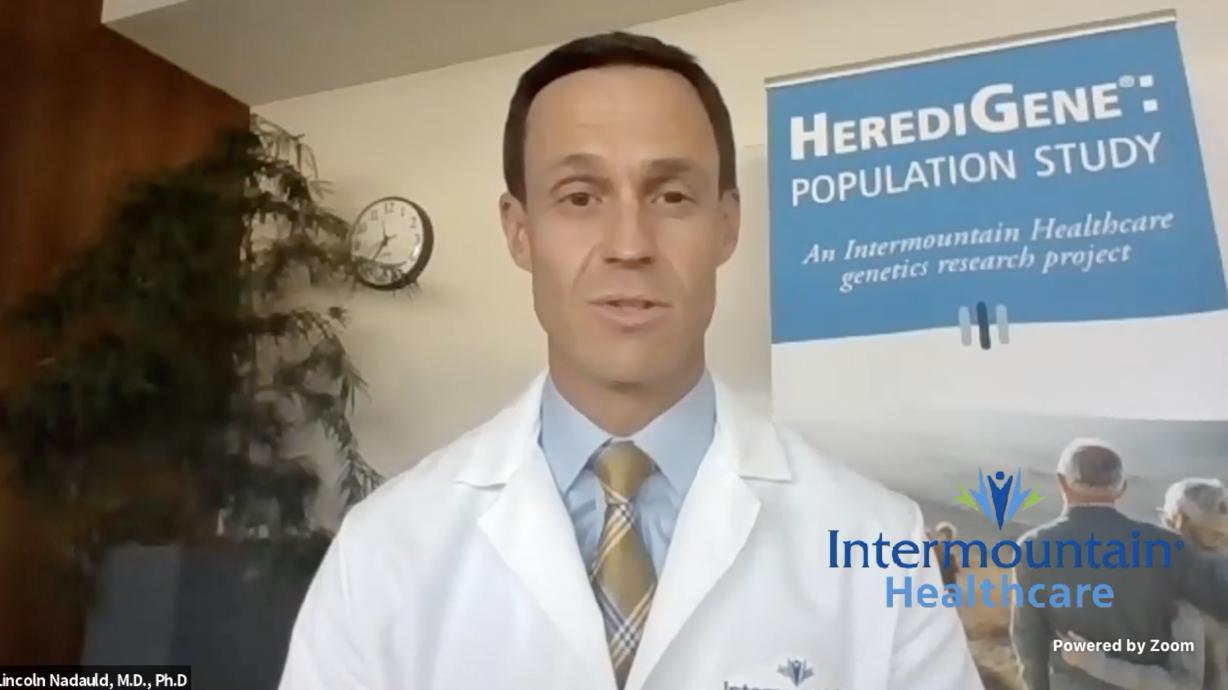Estimated read time: 5-6 minutes
This archived news story is available only for your personal, non-commercial use. Information in the story may be outdated or superseded by additional information. Reading or replaying the story in its archived form does not constitute a republication of the story.
ST. GEORGE — Sometimes when Stephanie Nay is driving, it feels like the sky is quite literally falling. It spins around and underneath her until she has to pull over to recuperate.
Sometimes when she is simply standing, a tunnel suddenly appears, rotating around her. On bad days it happens multiple times a day. And because of a recent discovery by Utah and Icelandic scientists, she may finally know why — it has to do with six genetic variants.
After lots of specialists, labs, imaging and hearing and balance tests, she was diagnosed with vertigo, an often unexplained condition that includes a sense of spinning and dizziness as well as balance problems. There was not much doctors could do for her without understanding the condition better, so she donated a small blood sample to a project.
That sample, along with tens of thousands of others, was used to discover the genetic underpinnings of vertigo, Intermountain Healthcare officials announced during a virtual press conference Wednesday.
Scientists had previously realized that there was probably a genetic foundation for the condition, but researchers from Intermountain and deCODE Genetics, a subsidiary of Amgen in Iceland, collaborated to identify the genes themselves.
The researchers tested nearly 50,000 DNA samples against more than 894,500 controlled samples to discover six common genetic variants associated with vertigo.
Vertigo can last for years and affects nearly 40% of Americans at some point in their life, according to an Intermountain press release. It's also one of the leading causes of emergency room visits across Intermountain Healthcare facilities.
The groups have been collaborating on the HerediGene: Population Study, the world's largest DNA-mapping initiative and study by collecting and studying DNA samples from over 80,000 participants since 2019. The purpose of the project is to make new medicine to treat diseases by discovering the nature of the diseases themselves.
"Our discovery of these genetic variants associated with vertigo is a great example of the types of important findings that we think are to come from the HerediGene: Population study," said Kári Stefánsson, founder and CEO of deCODE genetics.
Once the genes that cause the diseases are discovered, the researchers can contact patients with those genes, let them know of the results, connect them to the right physicians and hold the patients' hands through the screening process, said Dr. Lincoln Nadauld, vice president and chief of precision health and academics for Intermountain Healthcare.
"It's an extraordinarily altruistic approach and study and that's one of my favorite features of what we're doing here," he added.
The scientists also found eight vertigo associations with sequence variants that were previously associated with age-related hearing impairment and motion sickness, though none of the six variants were associated with hearing loss.
"Our study revealed sequence variants in genes that may contribute to the pathogenesis of diseases in either the auditory system or vestibular (sensory) system and thus, further our understanding of the biological underpinnings of these two systems," the investigators stated in the report.
Dizziness is also often a symptom of cardiovascular issues because of lack of blood flow, so this discovery will allow scientists to more easily and efficiently diagnose patients and send them to the correct specialists for help. It will also allow doctors the opportunity to intervene in the lives of the patients immediately rather than undergoing the lengthy series of inconclusive tests that Nay went through to try to diagnose her and treat her issues.
"Once we know the exact cause of that person's disease, we can start to tailor our therapy specifically to that. It's very helpful to be able to make a clear diagnosis," said Dr. Kirk Knowlton, chair of the department of cardiovascular research for the Intermountain Healthcare Heart Institute.
Nay said that she thinks it would be great to have the lab work identify these genes early on so people don't have to go through the months of inconclusive tests and screenings she went through. She's also looking forward to seeing what this research can do for her condition.
"I'm very excited about the application of this to really be able to have these tools and resources," she said.
Going forward, the next step is to use this research to help treat vertigo sufferers because there previously has not been much in the way of medical prevention and treatment possible.
"It's one thing to make the discovery. It's another thing to deliver that to the patients. And I think that's one of the strengths (Intermountain) has with our large, connected health care system able to try to tease these things out," Knowlton said.
Next, the plan is to continue finding genes that cause diseases by enrolling more patients into the study to be able to look at an even larger set of numbers for research.
"What has surprised me is that this discovery has come so soon in our study. We anticipate hundreds of thousands of participants in this collaboration," Nadauld said. He credited the outstanding scientists and said that he believed this discovery meant they were dealing with "very clean data."
"We have an awful lot of work ahead of us. It is beginning to look very exciting. We have several discoveries coming out. We'll have the opportunity to share those with you in the near future," Stefánsson said.
Anyone can enroll in the HerediGene: Population Study at no cost by consenting at HerediGene.org and donating a small amount of blood at an Intermountain Healthcare hospital or clinic. Its goal is to better predict and prevent serious diseases through research and discovery.









